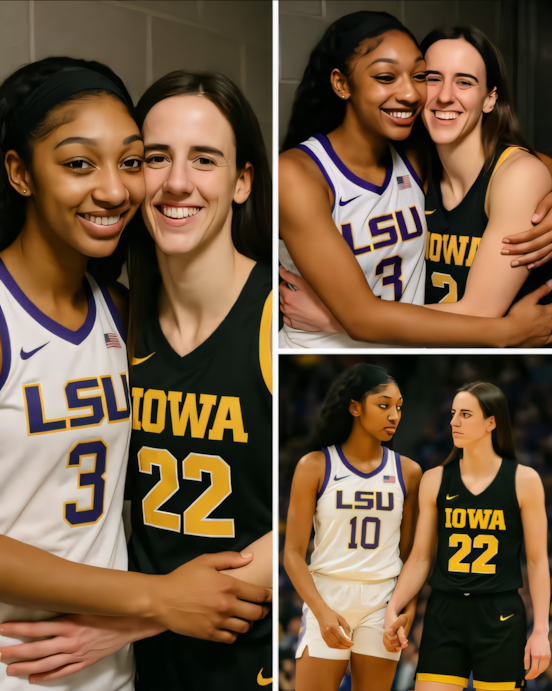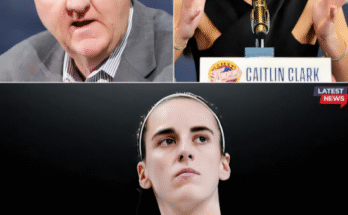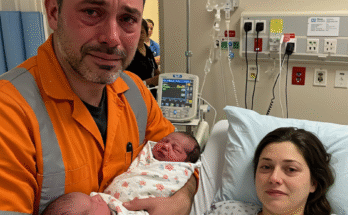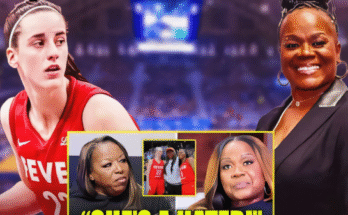In a stunning and emotional revelation that’s sending shockwaves across the sports world, a new video has surfaced featuring Angel Reese speaking out for the first time in depth about her complex relationship with fellow basketball star Caitlin Clark. For months, speculation has swirled. Were they bitter rivals? Were they simply misunderstood? Now, for the first time, Reese is setting the record straight — and it’s not what fans were expecting.
The Backdrop of the Rivalry
To understand the weight of Reese’s words, it’s crucial to rewind to the 2023 NCAA Women’s Basketball Tournament — a cultural and athletic moment that etched both Reese and Clark into the public consciousness. Their performances were electric. Caitlin Clark’s deep threes and command of the court made her a household name, while Angel Reese’s dominance in the paint and her unrelenting competitive spirit led LSU to a championship victory.
But it wasn’t just the gameplay that had fans buzzing. A gesture — the now-infamous “You Can’t See Me” hand wave — exchanged between the two players during the title game fueled online debates. Was it poor sportsmanship or just confident swagger? The media ran wild, and so did the internet. Headlines screamed of rivalry, tension, even animosity.
The Video That Changed Everything
In the newly released video, which quickly shot to the top of trending charts across YouTube, TikTok, and Instagram Reels, Angel Reese sits down for a no-holds-barred conversation. The tone is different — softer, more introspective. The 22-year-old star is raw and vulnerable, a sharp contrast to the fierce competitor fans see on the court.
“People wanted to paint this picture like we hate each other,” Reese begins, her voice calm but steady. “But they don’t see what goes on outside of the 40 minutes on the hardwood. They don’t know what it’s like to be two young women carrying the weight of an entire sport on our backs.”
Reese doesn’t dodge the tough questions. She addresses the tension directly.
“Yes, there were moments where it was heated. We’re competitors. We want to win. I’m not going to apologize for that. But it was never personal. It was never about hate. It was about passion.”
Behind the Scenes
One of the most powerful parts of the video is when Reese opens up about what fans didn’t see — the private messages exchanged between her and Clark, the mutual respect, the shared frustrations about media narratives, and the quiet support they gave each other when the cameras weren’t rolling.
“She texted me after the game,” Reese recalls. “And I texted her back. That’s what people don’t know. We talked. We respected each other. We both know what it’s like to be doubted, to be criticized, to be told we’re too loud or too confident.”
Reese’s voice trembles slightly when she discusses the pressure of being thrust into the spotlight at such a young age. “You wake up one day and suddenly you’re a symbol. You’re representing something bigger than yourself, and everyone wants a piece of your story — but not the truth. Just the drama.”
Rewriting the Narrative
Throughout the video, it’s clear that Reese is not just speaking for herself — she’s speaking for a generation of female athletes who are tired of being pitted against each other. She challenges the media’s tendency to stir rivalry narratives between women, especially Black women and white women in sports.
“This isn’t a movie. It’s not heroes versus villains,” she says. “We’re both out here grinding, sacrificing, chasing our dreams. We don’t need to tear each other down to build ourselves up.”
The internet reaction was instant and explosive. Comments poured in, applauding Reese’s candor and emotional maturity. Even critics who once questioned her sportsmanship began to reconsider their stance. The video has sparked a broader conversation about how we consume and interpret female athleticism and how much of what we see is shaped by narratives beyond the court.
Caitlin Clark Responds
Not long after the video dropped, Caitlin Clark herself responded on her social media with a brief but powerful message:
“Nothing but respect. Always have, always will. Keep shining, Angel.”
The message was shared widely, confirming what Reese had claimed — that the rivalry may have been largely a media construct, exaggerated by fans and commentators hungry for controversy.
Bigger Than Basketball
For both Reese and Clark, this moment represents something much larger than a basketball feud. It’s a reckoning — a chance to shift the way women in sports are portrayed. It’s about reclaiming the narrative and reminding everyone that competition doesn’t have to mean conflict.
Reese ends the video with a quiet but powerful statement:
“We’re not enemies. We’re history-makers.”
The Aftermath
As the clip continues to gain traction, it’s clear that Angel Reese’s decision to speak up — honestly, vulnerably, and without filter — is resonating. It’s a rare moment of clarity in a media landscape often clouded by hot takes and controversy-chasing headlines.
Fans and fellow athletes alike are praising her courage, and the moment feels like a cultural reset — a reminder that athletes are human, that stories are complex, and that not everything has to be reduced to winners and losers.
Whether you’re a diehard basketball fan or just someone interested in the intersection of sports and culture, this is a moment worth watching — not just before it disappears, but before it transforms how we see the game, and each other.



